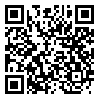BibTeX | RIS | EndNote | Medlars | ProCite | Reference Manager | RefWorks
Send citation to:
URL: http://jcp.khu.ac.ir/article-1-2458-en.html
This study aim to compare the cognitively biased information processing in anxiety, depression and was normal people. The study was causal-comparative study of 50 subjects anxious subjects, 50 subjects with depression and 50 normal subjects were formed by students of Tabriz University of Medical Sciences were selected using data Bvdnd.grdavry anxiety scales and Beck Depression scale psychological symptoms and clinical interviews, tests, and test complete root words were a reminder properties and data were analyzed using multivariate analysis of variance. The results showed that explicit and implicit memory between the three groups, anxious, depressed and normal in terms of positive, negative, and there was a significant threat, while threatening words of anxious, depressed subjects with negative words and positive words of ordinary scores were higher. But there was no significant difference in terms of neutrality between the three groups. It can be concluded that information processing in explicit and implicit memory bias creates and causes the information to be more consistent with the mood.
Accepted: 2016/05/31 | Published: 2016/05/31
| Rights and permissions | |
 |
This work is licensed under a Creative Commons Attribution-NonCommercial 4.0 International License. |






